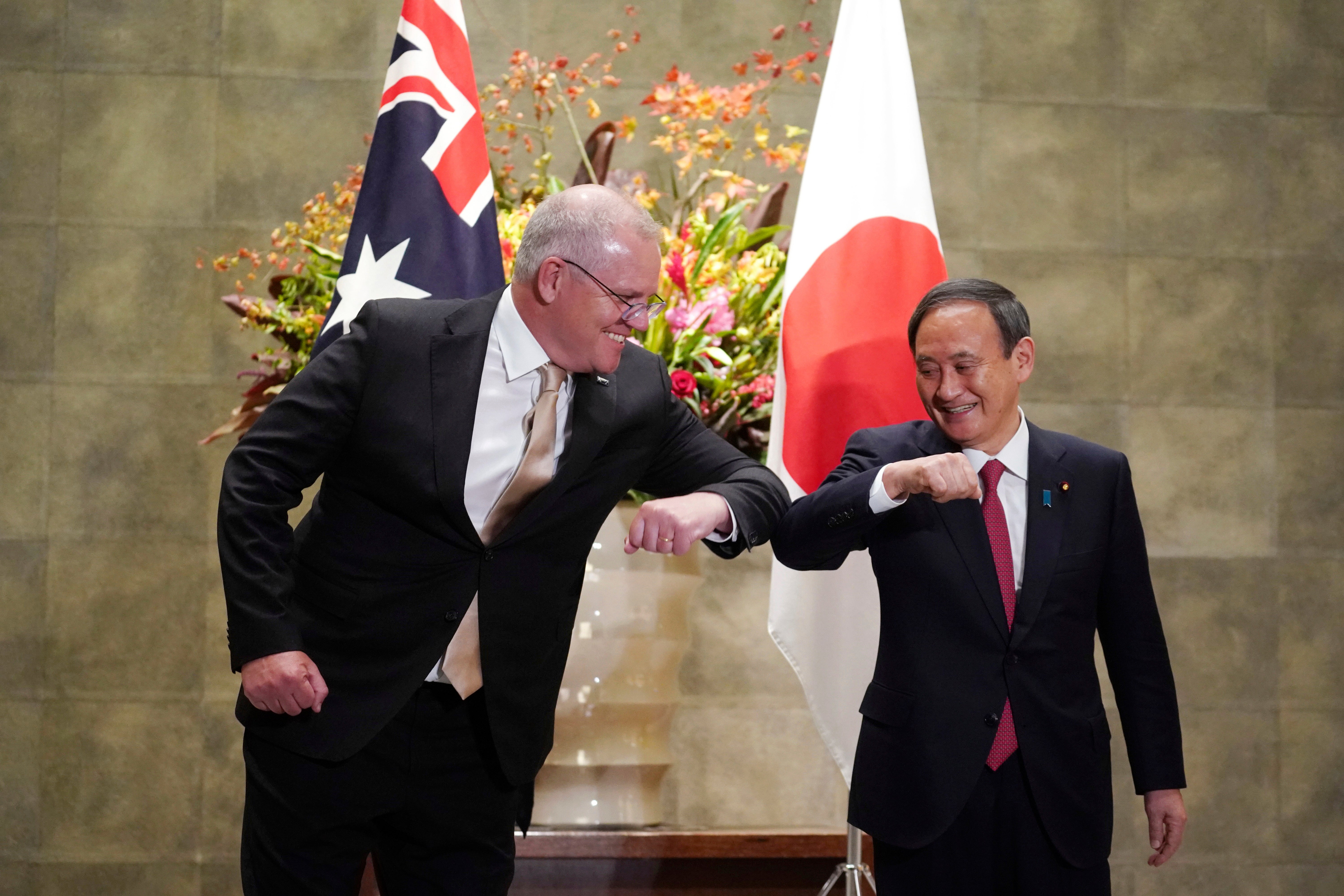Australia, Japan to bolster defense ties amid China's rise
The leaders of Australia and Japan have held in-person talks to bolster defense ties between the two U.S. allies to counter China’s growing assertiveness in the Asia-Pacific region amid the transition in American leadership

Your support helps us to tell the story
From reproductive rights to climate change to Big Tech, The Independent is on the ground when the story is developing. Whether it's investigating the financials of Elon Musk's pro-Trump PAC or producing our latest documentary, 'The A Word', which shines a light on the American women fighting for reproductive rights, we know how important it is to parse out the facts from the messaging.
At such a critical moment in US history, we need reporters on the ground. Your donation allows us to keep sending journalists to speak to both sides of the story.
The Independent is trusted by Americans across the entire political spectrum. And unlike many other quality news outlets, we choose not to lock Americans out of our reporting and analysis with paywalls. We believe quality journalism should be available to everyone, paid for by those who can afford it.
Your support makes all the difference.The leaders of Australia and Japan held in-person talks on Tuesday to bolster defense ties between the two U.S. allies to counter China's growing assertiveness in the Asia-Pacific region amid the transition in American leadership.
The two countries are close to concluding a Reciprocal Access Agreement, a legal framework to allow their troops to visit each other's countries to conduct training and joint operations.
During the talks in Tokyo, Australian Prime Minister Scott Morrison and his Japanese counterpart, Yoshihide Suga, were expected to further discuss the deal, though it was not immediately clear whether it would be finalized. They were also expected to discuss the coronavirus and the economy, Japanese officials said.
If signed, the deal would be Japan's first such pact since the 1960 status of forces agreement with the United States, which set bases for about 50,000 American troops to operate in and around Japan under the Japan-U.S. security pact.
Japan is committed to maintaining and deepening its 60-year-old alliance with the U.S. as the cornerstone of its diplomacy and security, but has in recent years sought to complement its regional defense by stepping up cooperation with others, especially Australia, amid China's growing maritime activity that has spread from the East and South China seas and beyond.
Japan still sticks to self-defense and bans first strikes under its postwar pacifist constitution, but bolstered its defense role and spending under former Prime Minister Shinzo Abe.
Abe pushed Japan's military cooperation and weapons compatibility with the U.S. as its forces increasingly work alongside U.S. troops. He also bolstered purchases of costly American stealth fighters and other arsenals.
Suga, who took office in mid-September after Abe resigned due to ill health problems, is carrying on his predecessor's diplomatic and security policies.
Japan considers Australia as a semi-ally and the two countries signed a defense cooperation agreement in 2007, a first for Japan with a country other than the U.S. The two nations agreed on the sharing of military supplies in 2013, expanding the deal in 2017 to include munitions after Japan eased restrictions on arms equipment transfers.
Japan has initiated a “Free and Open Indo-Pacific" vision of economic and security cooperation as a counter to China's influence, and recently hosted foreign ministerial talks among the countries known as the Quad that also include the U.S., Australia and India.
Those four nations are now seeking to bring in more countries, from Southeast Asia and beyond, that share concerns about China's increasing assertiveness in the region.
China defends its actions in the regional seas as peaceful and denies violating international rules. It has criticized the Quad as a NATO in Asia to counter China.
Despite its pacifist constitution, Japan’s defense spending ranks among the world’s top 10, according to the Stockholm International Peace Research Institute. Australia ranks among the top 15.
___
Follow Mari Yamaguchi on Twitter at https://www.twitter.com/mariyamaguchi